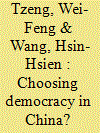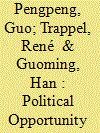| Srl | Item |
| 1 |
ID:
157481


|
|
|
|
|
| Summary/Abstract |
We argue that the choice of electoral rules in Chinese villages results from the incentives that rural party elites face in their efforts to control electoral results. Using the rationalist approach, we propose four conditions under which they will adopt an institution that allows for electoral uncertainty: a large proportion of revenue from village-owned enterprises (VOEs), a large size of electorate, the presence of strong social groups, and frequent upper level government interventions. We use the 2011 Wukan incident to illustrate our argument. The cross-sectional analysis of survey data of 961 villages provides some evidence for the hypotheses: A larger number of labor force and frequent inspections by the upper-level government are significantly correlated with an increase of the likelihood that a village party leader allows villagers to freely nominate candidates. Theoretical and policy implications will be discussed in the end of this paper.
|
|
|
|
|
|
|
|
|
|
|
|
|
|
|
|
| 2 |
ID:
179946


|
|
|
|
|
| Summary/Abstract |
How does "rightful resistance" take place in contemporary rural China? The continuously evolving village election system, the abolishment of the agricultural tax, and a new insistence on fighting corruption seemingly have created more space for the rural population in China to defend its rights. However, the central state's emphasis on solving the so-called three rural issues (sannong wenti 三农 问题)—raising incomes and welfare for the rural population, modernizing the countryside, and developing industrialized and modern agriculture—in a topdown manner and the continued use of "project-based management" have also greatly decreased the ability of the rural population to influence the agenda of the state and have thereby increased the potential for friction between the local state and its rural citizens. This article is a case study of a dispute between villagers and local cadres about the implementation of a reforestation project. While the case shows that villagers have several avenues for protest, it also hints at the low effectiveness of their protest and the continued existence of important structural obstacles dealing with different levels of the administration, including the atomization of villagers, the volatile nature of their interest coalition, and a profound lack of allies in society.
|
|
|
|
|
|
|
|
|
|
|
|
|
|
|
|